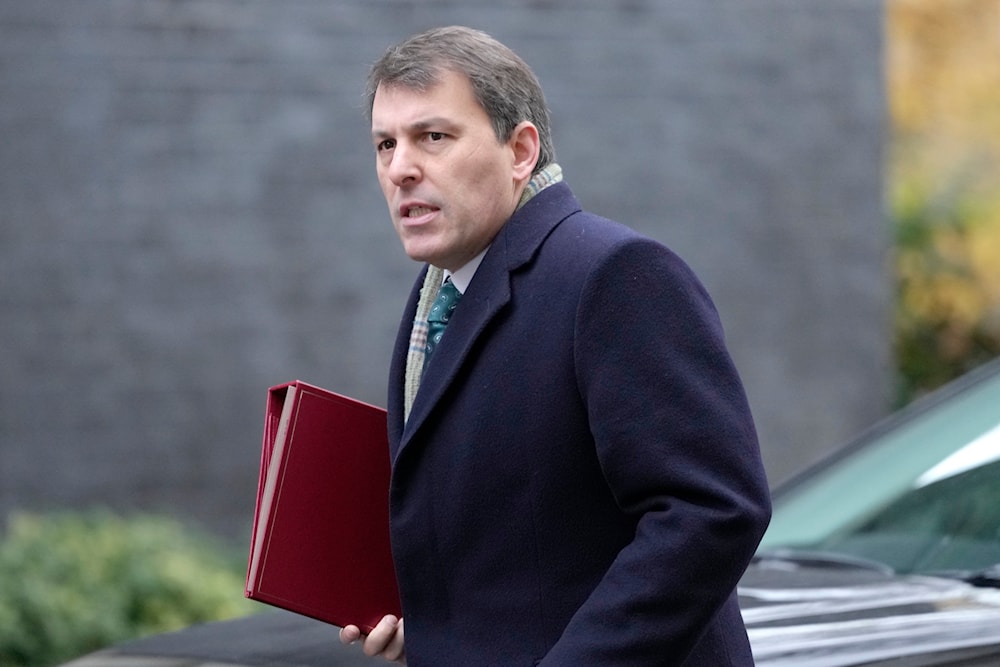UK contaminated blood scandal could see £2.5mln+ compensation scheme
The Paymaster General John Glen reveals details of the compensation scheme.
-

Former UK Chief Secretary to the Treasury John Glen arrives in Downing Street to attend a cabinet meeting in London, on Tuesday, December 13, 2022. (AP)
More than £2.5 million in compensation could be given to the victims of the UK contaminated blood scandal under the multi-billion pound scheme announced a day after a report found the NHS and government responsible for the tragedy.
Following criticism in Sir Brian Langstaff’s final report of the UK government’s failure to launch a compensation framework for those infected and affected by the scandal, which he had urged for last year, the details of the scheme were outlined in parliament on May 21 by the Paymaster General John Glen.
Glen, who also mimicked Rishi Sunak's apology, announced a new infected blood compensation authority with Robert Francis, the person who wrote the report on compensation and prompted Langstaff's suggestions on payments, as its interim chair.
Francis will get the opinion of the infected blood community on the suggested scheme over the next few weeks before it is all finalized, however, it is expected that the final payments will start before the end of the year, according to the paymaster general.
Alongside being disregarded for means-tested benefit evaluations, the payments will be exempt from income, capital gains, and inheritance tax. Glen revealed that in conformity with Francis' suggestions, the compensation would depend on the impact of physical and mental injury caused by infection, the stigma and social isolation suffered, the disturbance of family and private life, care costs, and financial losses.
Details into the compensation
The paymaster general said that as people were "still dying each week from their infections" and may fear that they would not live to get the compensation, before the establishment of the full scheme, infected people who have already gotten interim payments of £100,000, will also get £210,000 within 90 days "so that they can reach those who need it so urgently most."
Speaking with the MPs, he added, "To be crystal clear, if you have been directly or indirectly infected by NHS blood, blood products, or tissue contaminated with HIV or hepatitis C or have developed a chronic infection from blood contaminated with hepatitis B, you will be eligible to claim compensation under the scheme and, where an infected person has died but would have been eligible under these criteria, compensation will be paid to their estate."
Further elaborating on the purpose behind this compensation, as well as who can apply for it, Glen said, "It’s not just the harm caused by the infections that requires compensation, it’s also the wrong suffered by those affected that must also be compensated for. So, when a person with an eligible infection has been accepted on to the scheme, their affected loved ones will be able to apply for compensation in their own right. That means partners, parents, siblings, children, friends, and family … who’ve acted as carers of those who are infected are all eligible to claim."
The government website published figures showing that people infected with hepatitis can get from £35,500, in compensation for an "acute" infection, and up to £1,557,000 for the most severe illnesses caused by the virus. Up to £2,615,000 can be given to people with HIV, while those with both infections can receive up to £2,735,000, based on their severity.
Even though officials are not revealing an estimate of the possible total cost of the scheme, saying it depends on whether more people come forward and how many get payments beyond the standard metric, the sum is predicted to be around £10 billion.
Concerns over delay in interim compensation payments to bereaved relatives
The founder of the Factor 8 campaign group, Jason Evans, whose father Jonathan died in 1993 after being infected with HIV and hepatitis C from contaminated blood product, said, "The government has confirmed that for those who die between now and when the further £210k interim payment is paid to those infected still living, the payment will be made to their estates. This is welcome."
"Taken together, the government’s announcement today creates fresh disparity. Some estates may have received £310k in total interim payments by the summer, while most may have received nothing. The community requires urgent clarification on these matters. Today’s announcement will be a gut punch to most bereaved families, who have still received no compensation at all," he added.
A senior partner at Collins Solicitors who has represented around 1,500 victims showed similar concerns to Evans' as he said that many bereaved families were "extremely disappointed that there is no information as to how the recently promised interim payment of £100,000 to be paid to estates may be claimed."
The chief executive of the Hepatitis C Trust Rachel Halford said, "It is reassuring to the infected blood community that someone who understands the scandal and the people affected by it will guide this important work. While the indications of the announcement are promising, much more detail is urgently needed to clarify who will be able to access financial support and when alongside clearer information on the future of existing blood support schemes."
Contaminated blood
Public inquiry's findings on the tainted blood crisis, which has resulted in 30,000 infections from tainted blood treatments, including 380 children, is considered the largest medical catastrophe in the NHS.
Findings showed that officials covered up the incident, exposing victims to unacceptable dangers in what Sunak characterized on May 21 as a "day of shame for the British state."
The Infected Blood Inquiry, which looked into 50 years of decision-making that led to, during, and following the infection of thousands by tainted blood beginning in the 1970s, accused doctors, the government, and the NHS of allowing patients to get HIV and hepatitis being let down "not once, but repeatedly."
Approximately 3,000 people have perished since then, with more expected.

 6 Min Read
6 Min Read








